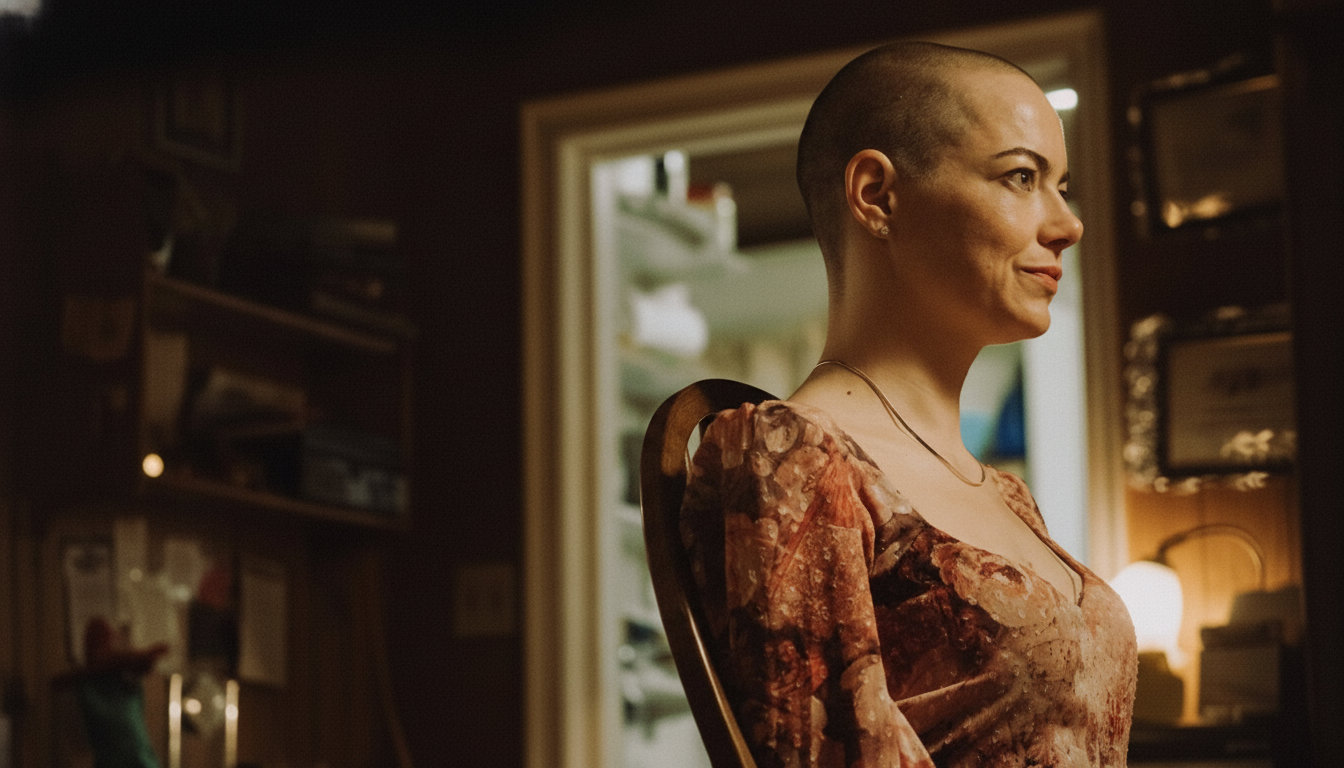Yorgos Lanthimos’s Bugonia concludes with a sci‑fi gut punch that recasts everything you thought you understood: kidnapped pharma titan Michelle is not merely an alien plant—she’s the Andromedan empress. The reveal makes a paranoid conspiracy thriller into a brutal morality play, and the closing image — bees flourishing where humans languish — lands like a parable. Here’s what it — and the rest of the finale — are doing, and saying.
What Really Happens in Bugonia’s Shocking Ending
Beekeeper Teddy kidnaps corporate giant Michelle, whom he believes is an alien intent on global domination. Following a slew of power reversals, Michelle entraps Teddy in Auxolith’s headquarters with the promise that her office closet is actually a transporter to a looming mothership. Then, Teddy’s “insurance” suicide vest malfunctions and explodes, ostensibly ending the nightmare.

But the movie isn’t bluffing. Michelle makes her way back to the office, enters the closet and is beamed up. The Andromedan empress rides in on the ship, wearing a dazzling imperial headpiece. She explains how her people seeded humanity, watched horrified as humans destroyed themselves, and attempted to course-correct through Auxolith’s research. Teddy’s torture proves to be the final straw. With one flip — popping a protective bubble over a model Earth — Michelle ends human life. The planet’s bees, conspicuously, recover.
The Twist Upends Every Clue We Thought We Had
Lanthimos and the screenwriter Will Tracy plant the truth in front of our faces. The lunar eclipse deadline, Michelle’s preternatural calm, and her “communicating” hair — Hell, even the imperial lineage of Teddy’s rant — all pay off, though he shoots low: She ain’t an emissary — she is the sovereign. Stone’s performance operates like a triple bluff, hiding calibrated control behind victimhood, then behind plausibly human crisis management, before finally revealing regal remove.
The backstory turns the genre script on its head. The aliens were not here to conquer; they arrived in order to build and then compromise. Auxolith’s interventions — ostensibly miraculous drugs with terrible aftereffects — evolve, in the dark days of “Blue Ant,” into gruesome experiments in directed evolution. Teddy collects clues (corporate malfeasance, ecological collapse) and misunderstands the motive.
Does It Confirm the Thinking of Conspiracists?
Short answer: no. Bugonia verifies one over-the-top claim while rigorously condemning Teddy’s extremist rhetoric. He tortures Michelle, drugs his cousin, murders a cop and mislabels antifreeze as medicine, which kills his mom. The movie depicts the carnage that conspiratorial certainty wrecks, even if it accidentally slams into truth.
It does acknowledge real grievances (medical harm, corporate opacity, widening inequality and environmental freefall) that make paranoia feel enthralling. Studies on radicalization from organizations like RAND and academic centers that study conspiracies are consistent in finding that perceived injustice and distrust are powerful accelerants. Bugonia is not dismissive of skepticism itself, but rather the delusions turned into violence.

Why Bees Matter And The Title’s Deep Cut
The title isn’t adorable; it’s classical. “Bugonia” is that myth — from the time of Aristotle, but spectacularly enshrined by Virgil in The Georgics — that bees might generatively spring up spontaneously out of a slaughtered ox: a rebirthing back into life through death. Lanthimos literalizes the metaphor: Only through the most catastrophic “sacrifice” imaginable do the bees return en masse. It’s a cosmic joke and an eco-indictment.
Offscreen facts lend the image a sting. Up to 40% of insect pollinators are under threat of extinction, the Intergovernmental Science-Policy Platform on Biodiversity and Ecosystem Services has said. For years, the Bee Informed Partnership has released annual survey numbers on U.S. beekeepers losing about 40%–50% of their colonies. Bugonia’s coda fantasizes a reset where nonhuman systems recover when our pressures do too — a fantasy with an ugly price.
The Empress’s Verdict And The Ethics Of The Movie
Michelle’s order of annihilation gives the impression — from orbit, to employ some “Aliens” jargon — of unfeeling triage. From her point of view, humanity is a bankrupt project: violent, extractive, unreceptive to any possibility of corrective action. And yet the film hangs on the lives of common people — dancers, congregants, commuters — to remind us that we are not all our worst specimens. The judgment is not so much about valuing one person over another as it is a portrait of power choosing convenience over caring.
There’s a sharper barb, too. If Andromedans were our designers and then interferers via a drug giant, then their revulsion at us is an evasion. The conclusion is a damning indictment of paternalistic “saviors” who inflict damage and then wash their hands when stewardship becomes troublesome.
Why the Ending Works So Well on Repeat Viewings
Everything is different when you know who Michelle is. Stone’s micro-calibrations, Jesse Plemons’ tunnel-visioned menace and the production’s tactile clues — things such as the closet’s uncanny staging, hair motifs and even the sterile warmth of Auxolith offices — snap into alignment. More shocking and also inevitable, it’s that rare twist well earned.
The bizarro conclusion of Bugonia isn’t a gotcha but a thesis. It posits that faith without humility is destined to become violence, power bereft of accountability is a path to extermination and nature outlasts us either way. The bees are not a source of comfort — they’re a judgment.

